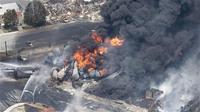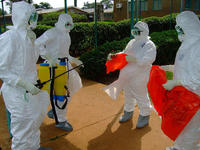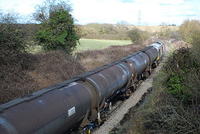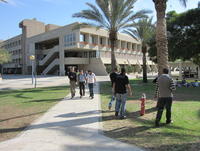-
Securiport’s advanced biometric immigration control systems help in fight against Ebola
Securiport says it is supporting the fight against the Ebola virus in West Africa by providing advanced biometric screening technologies and comprehensive contact tracing data analytics to help governments and health organizations monitor and control the spread of the virus. The company’s immigration control systems are now in place across a total of seven West African nations, including Sierra Leone, Senegal, and Ivory Coast.
-
-
Boston developers continue to build on the waterfront, but take account of sea level rise
The threat of rising sea levels has not discouraged property developers and buyers in Boston from investing in multi-million dollar condos located along the city’s waterfront. Boston developers are keeping copies of key building records off-site in case electricity shuts down during a storm surge. Some developers are moving mechanical systems from the basements of high rises to several stories above ground, to ensure power and critical systems are intact during a flood.
-
-
Petroleum industry, railroads want deadline extension for phasing out old tank cars

Transportation of crude oil by train jumped to 408,000 in 2013, from 11,000 in 2009, partly due to the rise in production from North Dakota’s Bakken region, where oil production has surpassed pipeline capacity. The increasing use of rail to transport crude oil has resulted in several accidents. The Department of Transportation want to phase out older tank cars — because they have thinner shells and are thus more vulnerable to accidents when transporting flammable liquids like crude oil – and replace them with new, safer tank cars with thicker shells. The petroleum industry and U.S. railroads want DOT to extend the deadline for phasing out old tankers from two years to four years.
-
-
FDA, industry face pressures to ensure safety of food ingredients
Confusion over a 1997 Food and Drug Administration (FDA) rule that eases the way for food manufacturers to use ingredients “generally regarded as safe,” or GRAS, has inspired a new initiative by food makers. Food safety advocates say the current GRAS process allows substances into the food supply that might pose a health risk, while industry defends its record.
-
-
New cyber initiative to put Israel’s Beer-Sheva region on the world’s cyber map
Ben-Gurion University of the Negev is a central component of the new CyberSpark initiative, an ecosystem with all the components which will allow it to attain a position of global leadership in the cyber field. The CyberSpark initiative is the only complex of its type in the world – a government-academic-industry partnership which includes Fortune 500 companies and cyber-incubators, academic researchers and educational facilities, as well as national government and security agencies. The CyberSpark Industry Initiative will serve as a coordinating body for joint cyber industry activities with government agencies, the Israel Defense Force (IDF), and academia.
-
-
U.S. hospitals unprepared to dispose of Ebola-related waste

A board of biological safety experts has warned that many U.S. hospitals may be unprepared to dispose of Ebola-related waste safely, should the disease arrive in any great number within the mainland. Many waste management companies are refusing to perform any service where waste items – such as soiled sheets and medical protective gear involved with treating the disease – would have to be handled. They cite federal guidelines which state that such items would require special training and packaging by people with hazardous materials training.
-
-
California agriculture faces greatest water loss ever seen
California produces nearly half of U.S.-grown fruits, nuts, and vegetables, and nearly a quarter of the nation’s milk and cream. Across the nation, consumers regularly buy several crops grown almost entirely in California, including tomatoes, carrots, broccoli, almonds, walnuts, grapes, olives, and figs. Researchers show that California agriculture is weathering its worst drought in decades due to groundwater reserves, but the nation’s produce basket may come up dry in the future if it continues to treat those reserves like an unlimited savings account.
-
-
CDC: First Ebola case diagnosed outside Africa; patient being treated in Dallas, Texas
The Center for Disease Control and Prevention (CDC) yesterday evening announced the first case of Ebola to be diagnosed outside Africa during the current outbreak, which has so far killed more than 3,000 people this year. The CDC said the patient left Liberia on 19 September, but did not develop symptoms until 24 September, when he was already in Dallas. He was admitted to the Texas Health Presbyterian hospital in Dallas on Sunday, 27 September. The possibility of treating the patient with experimental therapies was being discussed with the patient’s family. If the Texas patient receives the experimental treatment for Ebola, he will be the fifth to do so in the United States (a sixth American – a carrier of dual American-Liberian citizenship who worked for Liberia’s Ministry of the Treasury – contracted the disease in Monrovia in July and dies a few days later in a Lagos, Nigeria hospital). The FDA has issued warning letters to three privately held companies marketing what they claim are treatments to prevent or treat Ebola.
-
-
$3 million in grants for three pilot projects to improve online security, privacy
The National Institute of Standards and Technology (NIST) the other day announced nearly $3 million in grants that will support projects for online identity protection to improve privacy, security and convenience. The three recipients of the National Strategy for Trusted Identities in Cyberspace (NSTIC) grants will pilot solutions that make it easier to use mobile devices instead of passwords for online authentication, minimize loss from fraud and improve access to state services.
-
-
A first: Jury finds bank guilty of financing terrorism
In a major development on the terrorism financing front, a U.S. jury found Arab Bank Plc liable for providing material support to Hamas and ordered the bank to compensate nearly 300 Americans who are either victims or relatives of victims of at least two dozen attacks tied to Hamas in Israel and the Palestinian territories.
-
-
Reduce river pollution through water-quality trading
Allowing polluters to buy, sell, or trade water-quality credits could significantly reduce pollution in river basins and estuaries faster and at lower cost than requiring the facilities to meet compliance costs on their own, a new study finds. The scale and type of the trading programs, though critical, may matter less than just getting them started.
-
-
Ten years after Hurricane Ivan, Alabama communities are better prepared
Since Hurricane Ivan struck Baldwin County, Alabama and neighboring communities ten years ago, building officials have adopted better resilience protocols to protect human life and property from future storms. Ivan, which left an estimated $14.2 billion in damages throughout the Gulf Coast, is considered the worst storm to hit Alabama in twenty-five years, and the seventh most costly hurricane ever to affect the United States.
-
-
West Virginia mulls releasing crude oil shipment information to the public

In May 2014, the U.S. Department of Transportation(DOT) ordered railroads operating trains carrying more than one million gallons of Bakken crude oil to notify state emergency officials in states through which oil-carrying trains travel of the expected movement of such trains. The order came to allow first responders to be better prepared should an accident occur. CSX Corporation agreed to share shipping information with West Virginia officials, but refused to release the information to the public citing concerns about terrorism. DOT made it clear that citing terrorism concerns does not exempt crude oil shipment information from being released to the public.
-
-
$5 million for new cybersecurity building at Ben-Gurion University of the Negev

Ben-Gurion University of the Negev (BGU) is a central component of the new “CyberSpark” initiative, a multi-component cyber eco-system. It is the only complex of its type in the world which is a government-academic-industry partnership and includes Fortune 500 companies and cyber-incubators, academic researchers and educational facilities, as well as national government and security agencies. A $5 million contribution will underwrite construction of the building that will house the Cyber Security Institute.
-
-
Colorado recovering as it marks one year anniversary of devastating flood
On 29 September 2013 Colorado experienced the most severe natural disaster that had ever befallen the state. Within three days much of the state had experienced a rainfall equivalent to its total for the entire year. In the end, nine people died, nearly 1,000 were evacuated by helicopter, and 1,800 homes were destroyed. The total cost of the damage reached $2.9 billion. Now, a year later, Colorado is finally coming back.
-
More headlines
The long view
Ransomware Attacks: Death Threats, Endangered Patients and Millions of Dollars in Damages
By Dino Jahic
A ransomware attack on Change Healthcare, a company that processes 15 billion health care transactions annually and deals with 1 in 3 patient records in the United States, is continuing to cause massive disruptions nearly three weeks later. The incident, which started on February 21, has been called the “most significant cyberattack on the U.S. health care system” by the American Hospital Association. It is just the latest example of an increasing trend.
Chinese Government Hackers Targeted Critics of China, U.S. Businesses and Politicians
An indictment was unsealed Monday charging seven nationals of the People’s Republic of China (PRC) with conspiracy to commit computer intrusions and conspiracy to commit wire fraud for their involvement in a PRC-based hacking group that spent approximately 14 years targeting U.S. and foreign critics, businesses, and political officials in furtherance of the PRC’s economic espionage and foreign intelligence objectives.
European Arms Imports Nearly Double, U.S. and French Exports Rise, and Russian Exports Fall Sharply
States in Europe almost doubled their imports of major arms (+94 per cent) between 2014–18 and 2019–23. The United States increased its arms exports by 17 per cent between 2014–18 and 2019–23, while Russia’s arms exports halved. Russia was for the first time the third largest arms exporter, falling just behind France.
LNG Exports Have Had No Impact on Domestic Energy Costs: Analysis
U.S. liquified natural gas (LNG) exports have not had any sustained and significant direct impact on U.S. natural gas prices and have, in fact, spurred production and productivity gains, which contribute to downward pressure on domestic prices.
